In a harbinger of illiberalism, Trump fired the Archivist of the United States without telling her or Congress why
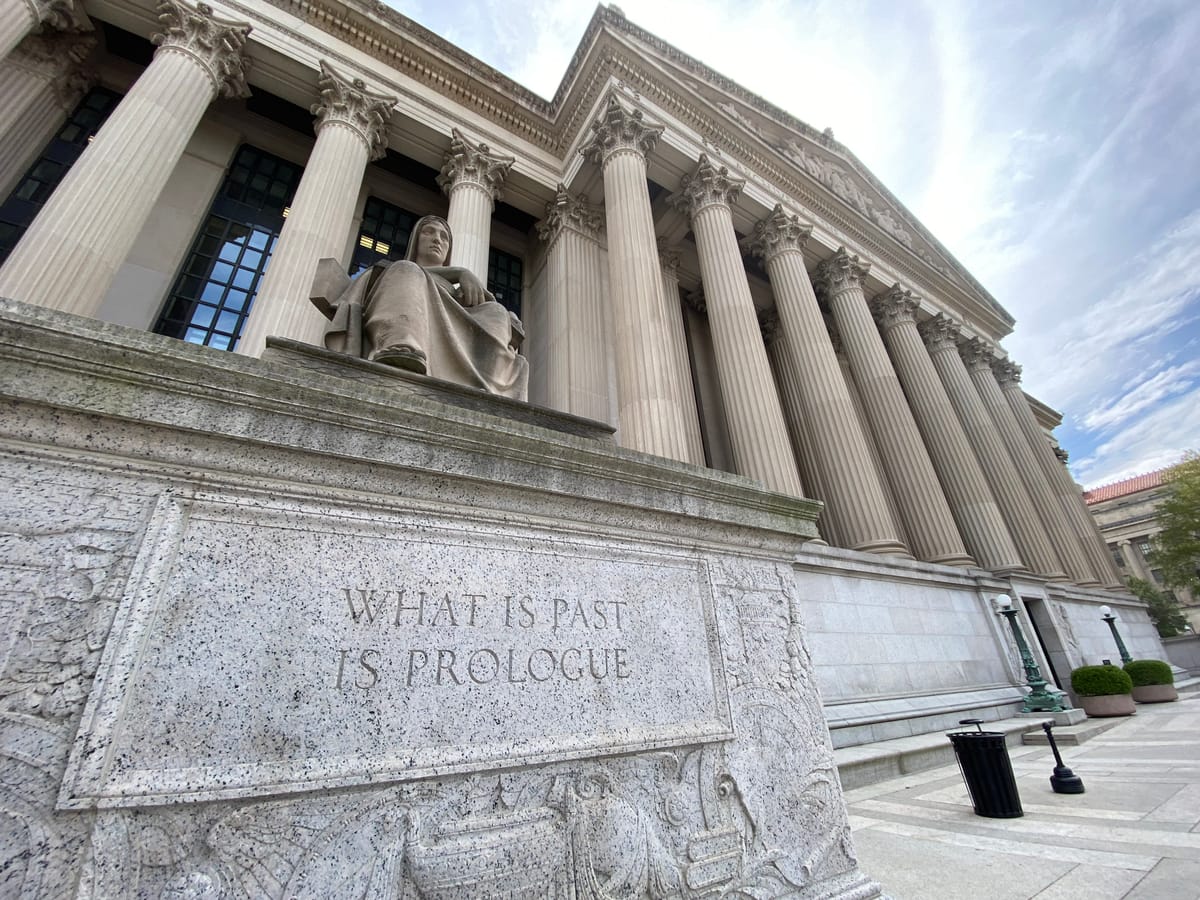
Good afternoon from Washington, where my daughter and I made blueberry pancakes and took the dogs for a walk before the rains rolled in. I hope you and yours are well this morning.
It’s good to see more new subscribers since yesterday! If you continue find what I send valuable, insightful, or useful, please share these pieces with your social networks, and consider becoming a paid member, if you're not already – or tell me what I need to do to earn your support at alex@governing.digital.
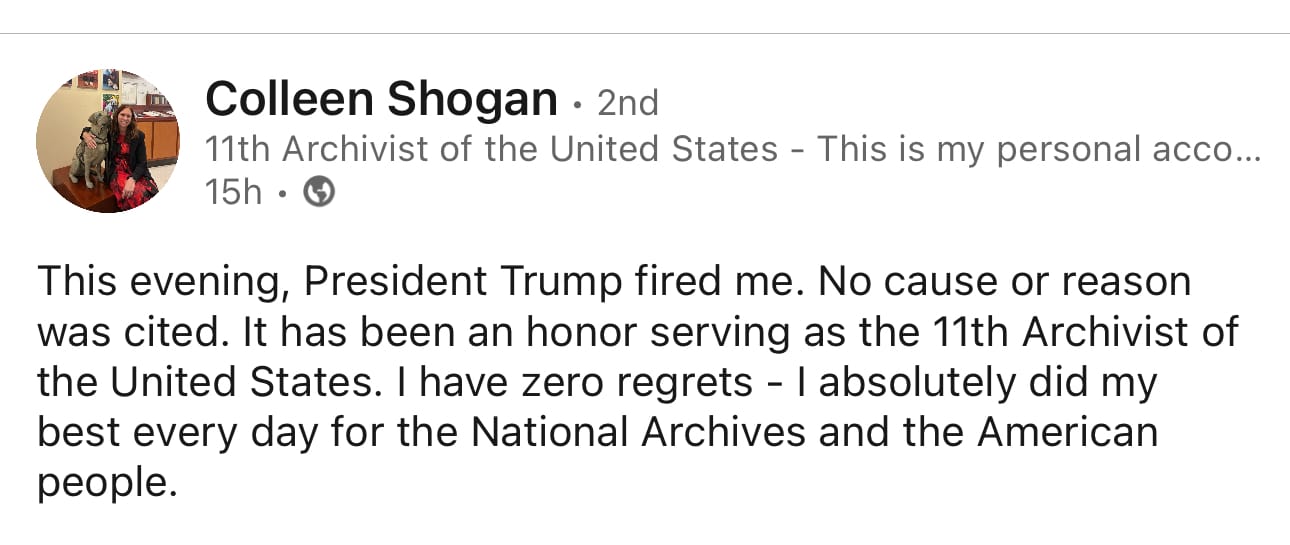
Thank you for your service, AOTUS
As I explored yesterday, ABC erroneously reported that President Trump had secretly fired the 11th Archivist of the United States and Secretary of State Marco Rubio had been appointed acting Archivist since Inauguration Day. That was not true.
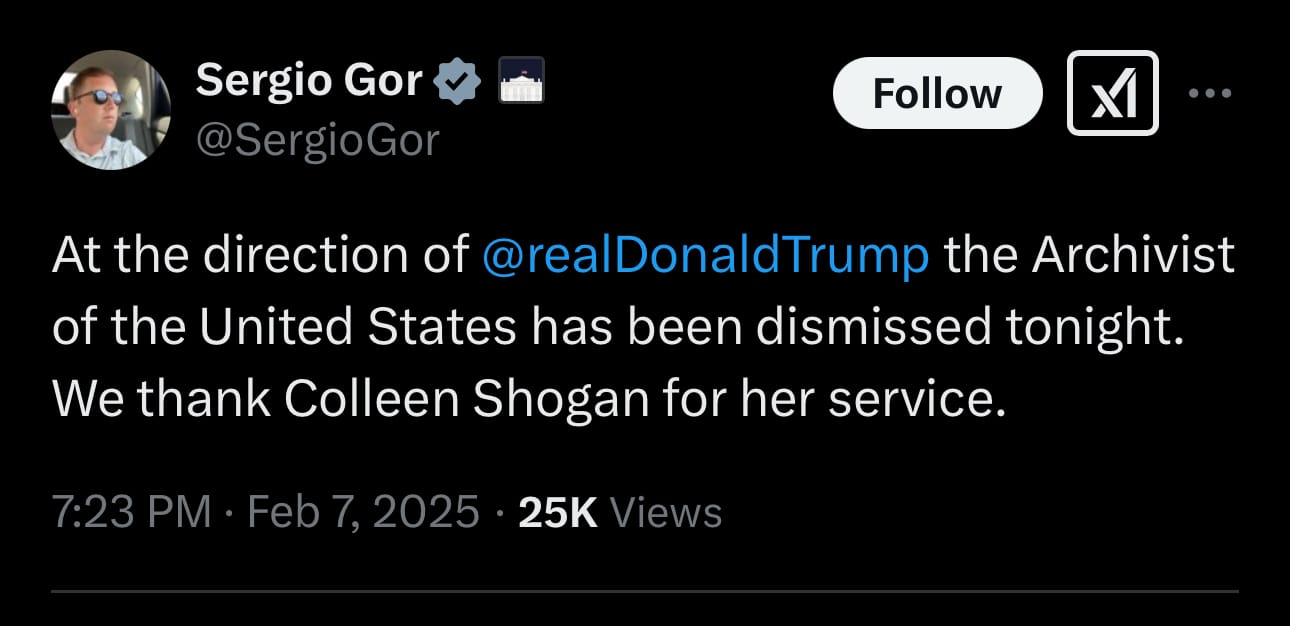
But last night, a White House official tweeted that Trump had fired the 11th Archivist of the United States and thanked jr for her service. He gave no rationale nor cause.
Jason R. Baron, former director of litigation at the Archives and now a professor of practice at the University of Maryland, told Politico that was troubled by this action, noting that federal law says the Archivist must be appointed “without regard to political affiliations and solely on the basis of … professional qualifications.”
“No good reason exists for firing Dr. Shogan, as she has faithfully carried out her duties in a nonpartisan fashion in the short time since being appointed U.S. Archivist by President Biden, “ he said.
“Dr. Shogan had nothing to do with the prior actions NARA staff took in connection with the successful return of boxes of presidential records that had been improperly transferred to Mar-a-Lago at the end of President Trump’s first term. Notwithstanding what President Trump might choose to believe, NARA is a completely nonpartisan agency, and NARA staff at all times have conducted themselves thoroughly professionally in ensuring that our Nation’s history is properly preserved.”
As Baron noted, federal law requires the President to communicate the reasons for any removal to Congress.
It’s not clear if he has done so. In a post on LinkedIn, Colleen Shogan wrote that no cause or reason was cited.
It’s a sad end to a promising term. Shogan was leading much-needed reforms and engaging with civil society stakeholder, continuing NARA’s open government programs, policies, and approaches.
When we have met and talked, I found her to be smart, deeply knowledgeable, thoughtful, honorable, frank, and honest — the very qualities every American should want in an Archivist.
Contrary to the smears I’ve seen online, Shogan was scrupulously nonpartisan and apolitical, with no signs of bias against any party nor candidate.
That said, when I asked about the risk of this day, Shogan told me she was building bridges with Members of Congress on both sides of the aisle to gain institutional support and increase funding for the chronically underfunded agency to accomplish its mission when was fired. That was not in the end a bulwark against this outcome.
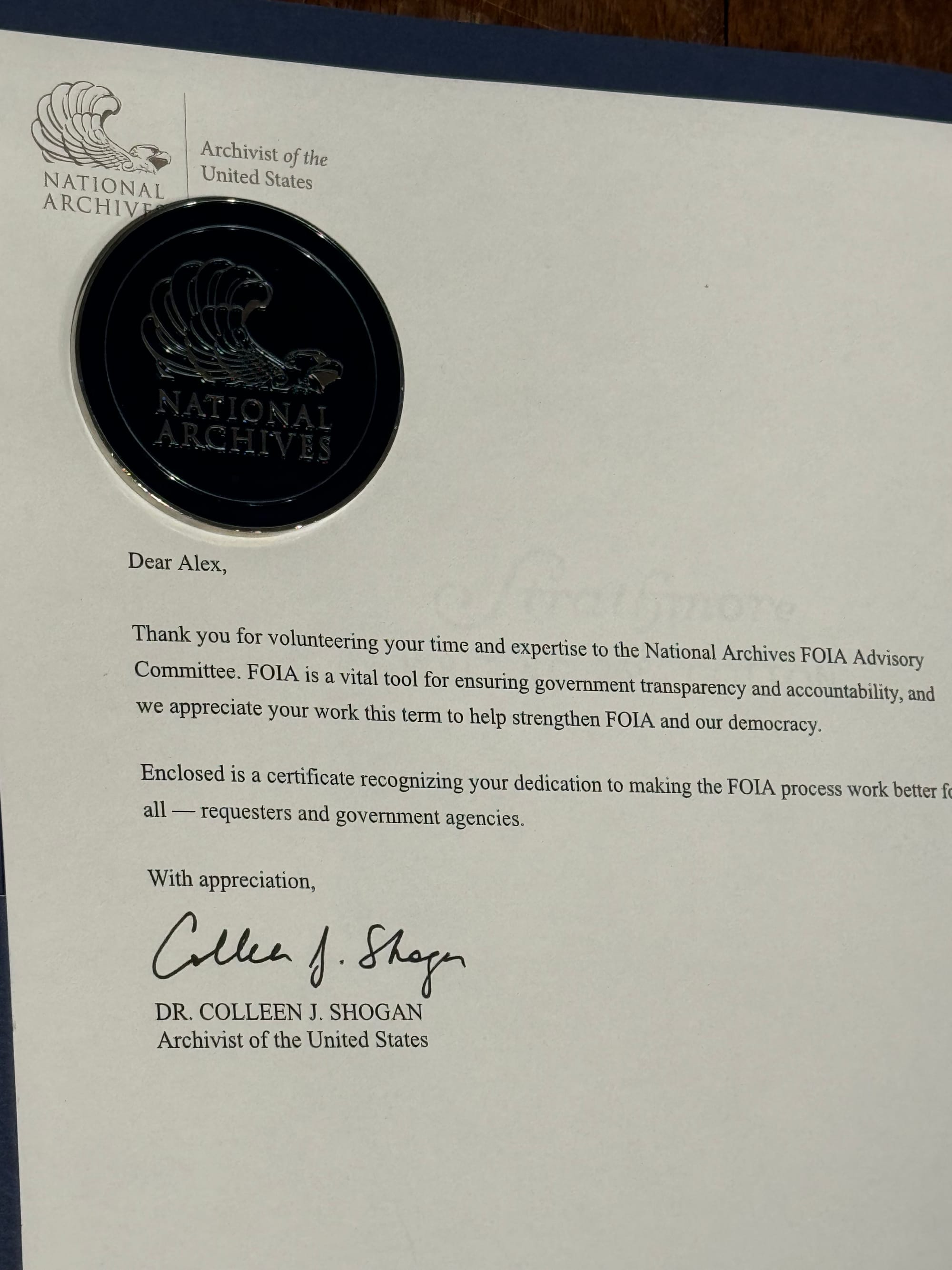
Shogan re-appointed me to the FOIA Advisory Committee and thanked me for my service after my term ended.
She always heard me and other advocates out when I raised concerns about modernization or archiving emerging media, or answered questions about her authority or priorities.

Shogan was the first woman to be AOTUS.
Our union is weaker without her service.
What does this mean?
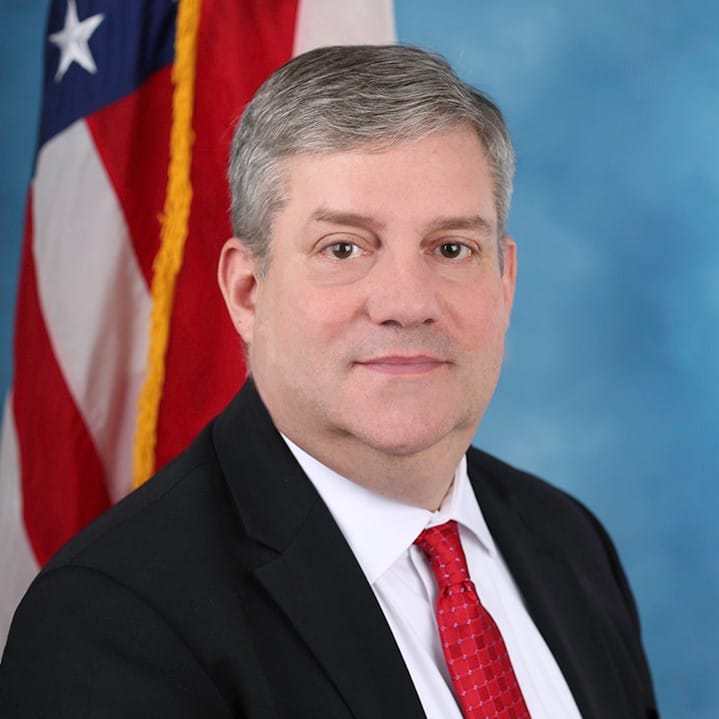
In the immediate term, federal law means that deputy archivist William Bosanko is acting AOTUS. 44 USC § 2103: Officers reads:
(a) The Archivist of the United States shall be appointed by the President by and with the advice and consent of the Senate. The Archivist shall be appointed without regard to political affiliations and solely on the basis of the professional qualifications required to perform the duties and responsibilities of the office of Archivist. The Archivist may be removed from office by the President. The President shall communicate the reasons for any such removal to each House of the Congress.
(b) The Archivist shall be compensated at the rate provided for level III of the Executive Schedule under section 5314 of title 5.
(c) There shall be in the Administration a Deputy Archivist of the United States, who shall be appointed by and who shall serve at the pleasure of the Archivist. The Deputy Archivist shall be established as a career reserved position in the Senior Executive Service within the meaning of section 3132(a)(8) of title 5. The Deputy Archivist shall perform such functions as the Archivist shall designate. During any absence or disability of the Archivist, the Deputy Archivist shall act as Archivist. In the event of a vacancy in the office of the Archivist, the Deputy Archivist shall act as Archivist until an Archivist is appointed under subsection (a).
I don’t see an immediate impact on public access, but morale at NARA and public trust will be damaged.
There will be continuity of operations and policy for now under Bosanko, who is an honorable career civil servant.
It’s plausible that we might see Trump attempt to appoint a different acting head could accelerate declassification of records Congress has ordered, including those Trump ordered be disclosed to start. Tecords around the assassinations of MLak, JFK, RFK files, or UFO/UAV files. We might then see a focus on former President Clinton, or the presidencies of former Presidents Obama and Biden.
Longer term, under a loyalist AOTUS, we could see them sign off on unauthorized access to classified records, weaponized disclosure at scale, or even removals of records foreign governments or dislike.
Presidential libraries are already are in financial distress and don’t have needed capacity to declassify records now. They may be starved of resources or closed — or supercharged if the administration invested money and personnel. We could see AI applied to declassification and revealing centuries of secrets with weird, good, & awful effects. We could see changing guidance and practices around records creation & retention with less regulation & enforcement.
If “public records are the backbone of open government,” as former AOTUS Ferriero said, then destroying records or preventing their creation would amount to ripping out the spine of our body politic, preventing the American people from knowing or rremembering what was done in our name.
Denying access to records requested under the Freedom of Information Act or blocking evidence of corruption, fraud, waste and abuse would mandate a form of authoritarian blindness.
Doing so would lobotomize our collective memory, robbing the American people of the public facts we need to be self-governing.
There’s also a worst case scenario.
A loyalist AOTUS in place could one day be relevant to certifying fraudulent votes in the electoral college, blocking access to historical records, or allowing their destruction.
In other words, a “Friday night massacre” of a nonpartisan guardian of public records may be an unappreciated harbinger of accelerating risk.
There is a reason authoritarian leaders and regimes around the world don’t want recordkeeping of any activity they wish to conceal from the public, although they generate vast reams of records about the public they survey, course, and control.
A secret police who are always listening for disloyalty would be a historic cliché, were it not so chilling in the context of a vast American surveillance apparatus and were we not aware of the history of the FBI and COINTELPRO.
Trump famously did not like people taking notes or using email in a business context — nor generating records and documents that could be held against him later in a court of law.
Not memorializing an official act is anathama to any honest civil service, which always must generate or see paper for public business. (Digital records are changing this everywhere.)
Congress must insist that the President publicly communicate why he removed the 11th Archivist and nominate a qualified candidate to carry out the assigned duties mandated for the head of the national archives and records administration.
Doing so is essential to their oversight responsibilities, as stewards of public trust, public funds, and public records.



